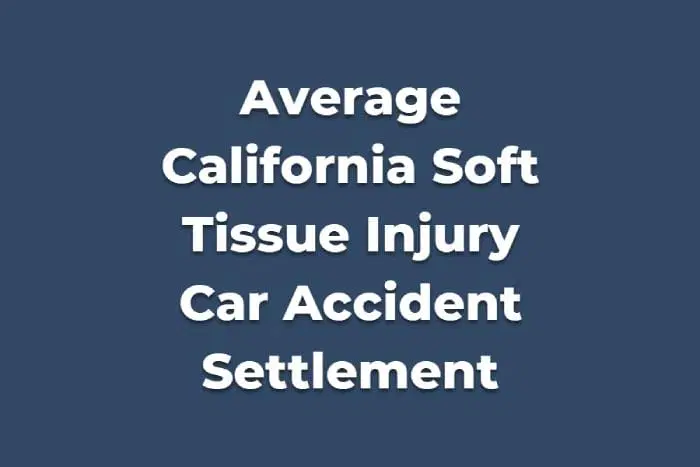
Average Soft Tissue Car Accident Injury Settlement in California
Legally reviewed by: Jessica Anvar Stotz, JD, MBA
Short answer: The average settlement for soft tissue injuries from car accidents in California is approximately $5,000 – $50,000. For minor soft tissue injuries, settlements often settle for approximately: $5,000 – $10,000. For more severe accidents, cases can settle for $50,000 or even more.
Soft Tissue Injury Settlement Chart
| Severity of Injury | Average Settlement Amount |
| Minor | Approximately: $5,000 – $15,000 |
| Moderate | Approximately: $15,000 – $50,000 |
| Severe | Approximately: $50,000 – $100,000+ |
Common Soft Tissue Injuries You May Be Able to Receive a Settlement for
Soft tissue injuries that could lead to a settlement in a personal injury case, particularly after a car accident, include:
- Whiplash: Neck injuries due to sudden acceleration or deceleration.
- Tendonitis: Inflammation of tendons often resulting from overuse.
- Bursitis: Inflammation of fluid-filled sacs (bursae) causing pain.
- Herniated Discs: Damage to spinal discs, often causing back or neck pain.
- Concussions: Mild traumatic brain injuries resulting from head impact.
- Soft Tissue Hematomas: Blood collection outside blood vessels, causing swelling.
- Joint Injuries: Damage to joints, such as the shoulder or knee.
- Muscle Tears: Damage to muscle fibers, causing pain and swelling.
Documenting these injuries thoroughly is crucial for pursuing a fair settlement.
Factors That Can Increase Soft Tissue Injury Settlements
Below are the key factors that can increase a settlement after someone suffered soft tissue injuries in a car accident:
- Medical Expenses: Including therapy and ongoing treatment.
- Loss of Income: Due to the inability to work.
- Pain and Suffering: Consideration of emotional distress.
- Documentation: Providing clear evidence of the extent of injuries, supported by medical records.
- Expert Opinions: Utilizing expert testimonies to strengthen the case.
- Negligence: If the accident resulted from another party’s negligence.
- Liability: Establishing the responsible party.
- Impact on Daily Life: Demonstrating how the injuries affect day-to-day activities.
- Long-term Consequences: Highlighting potential lasting effects.
- Thorough Presentation: Comprehensive documentation and presentation of the case details.
Factors That Could Reduce Potential Soft Tissue Injury Settlements
Below are factors that could potentially reduce soft tissue injury settlements in a car accident:
- Pre-existing Conditions: If the injured person had pre-existing health issues unrelated to the accident.
- Delay in Seeking Medical Attention: Insurance may question the severity if medical attention was not sought promptly.
- Inconsistent Medical Treatment: Gaps or inconsistencies in medical treatment records.
- No Clear Evidence of the Accident’s Impact: Lack of evidence linking the soft tissue injuries directly to the car accident.
- Contributory Negligence: If the injured party shares a portion of the fault for the accident.
- Limited Medical Documentation: Insufficient medical records supporting the extent and impact of the injuries.
- Low Impact Collision: Perception that the accident was minor, potentially minimizing the expected injuries.
- Insurance Policy Limits: If the at-fault party has limited insurance coverage, it can cap the potential settlement.
- Disputes on Causation: If there’s a dispute regarding whether the accident directly caused the soft tissue injuries.
- Quick Settlements: Agreeing to a quick settlement without thoroughly assessing the long-term consequences of the injuries.
Documentation Tips
Below are documentation tips that could help you secure fair compensation after suffering a soft tissue injury in a car accident:
- Medical Records: Obtain and keep all medical records related to the soft tissue injuries. This includes initial emergency room visits, follow-up appointments, and any therapy or rehabilitation sessions.
- Photographic Evidence: Take pictures of visible injuries, like bruises or swelling, as well as any property damage to vehicles. This visual evidence can strengthen your case.
- Prescriptions and Medications: Keep a record of any prescribed medications or pain relievers you receive, as well as receipts for these purchases.
- Doctor’s Notes: Retain any notes or instructions given by healthcare professionals, detailing the diagnosis, treatment plan, and anticipated recovery time.
- Medical Bills: Keep copies of all medical bills, including hospital stays, consultations, and any therapy or rehabilitation costs.
- Journal or Diary: Maintain a personal record of your daily experiences, noting pain levels, challenges in daily activities, and emotional distress. This can provide additional context.
- Witness Statements: If there were witnesses to the accident or individuals who observed your struggles post-accident, gather their statements or contact information.
- Employment Records: If you miss work due to the injuries, keep records of your work schedule, pay stubs, and any communication with your employer regarding the impact on your job.
- Insurance Correspondence: Keep a record of all communication with insurance companies, including claim numbers, adjuster names, and any written communication.
- Expert Opinions: If necessary, consult with medical experts or specialists who can provide opinions on the severity and long-term impact of your soft tissue injuries.
- Legal Consultation: Seek advice from an attorney experienced in personal injury cases. They can guide you on the best way to document and present your case for a fair settlement. They can also estimate what your case could be worth.
Why Delaying Medical Treatment Could Hurt Your Case
Delaying medical treatment after a car accident with soft tissue injuries can harm your potential settlement. Insurance companies may question the severity of injuries and their connection to the accident if treatment is postponed.
Prompt medical attention establishes a clear link between the accident and injuries, strengthening your case. Delayed treatment could be interpreted as a lack of urgency, potentially diminishing the perceived impact of the injuries.
Timely medical documentation is crucial for building a strong case and maximizing the chances of a fair settlement for the sustained soft tissue injuries.
How Long Could My Case Take?
The duration of a soft tissue injury car accident case varies widely. Simple cases with clear liability may be resolved in a few months through negotiations.
However, complex cases involving disputed liability or extensive injuries might take a year or more. Factors such as the need for extensive medical treatment, gathering evidence, and the court’s caseload influence the timeline.
Settlement negotiations, pre-trial proceedings, and potential appeals contribute to the variability. A quicker resolution is possible with efficient communication and a clear presentation of evidence, but the intricacies of each case determine the overall time frame.
What Not to Do After Your Car Accident
After suffering soft tissue injuries in a car accident that wasn’t your fault, avoid the following:
- Delaying Medical Attention: Promptly seek medical help to document injuries and establish a connection to the accident.
- Not Gathering Evidence: Collect information, take photos, and get witness contact details to support your case.
- Admitting Fault: Avoid making statements that could be construed as admitting fault, even if you feel apologetic.
- Settling Too Quickly: Don’t rush into settlements without fully assessing the long-term impact of your injuries and associated costs.
- Ignoring Medical Advice: Follow prescribed treatments and attend all medical appointments for a thorough recovery and documentation.
- Discussing the Case Openly: Be cautious about discussing the case on social media or with others, as it can be used against you.
- Not Consulting an Attorney: Seek legal advice to navigate the complexities of personal injury law and ensure your rights are protected.
Benefits of Working with an Attorney
Working with an attorney after a car accident offers numerous benefits. An experienced attorney understands the intricacies of personal injury law, helping you navigate complex legal processes.
They advocate on your behalf, negotiating with insurance companies to maximize your personal injury settlement. Attorneys gather and present evidence, ensuring a compelling case for liability and damages.
Their knowledge of applicable laws and precedents strengthens your position. Also, legal representation provides peace of mind, allowing you to focus on recovery while professionals handle the legal complexities. In many cases, having an attorney significantly improves the likelihood of a fair and just compensation for your injuries.
Connect with an Attorney
Looking for a lawyer after your car accident? Contact LawLinq today to get connected with some of the best car accident attorneys in the state for free. We offer free consultations 24/7.


